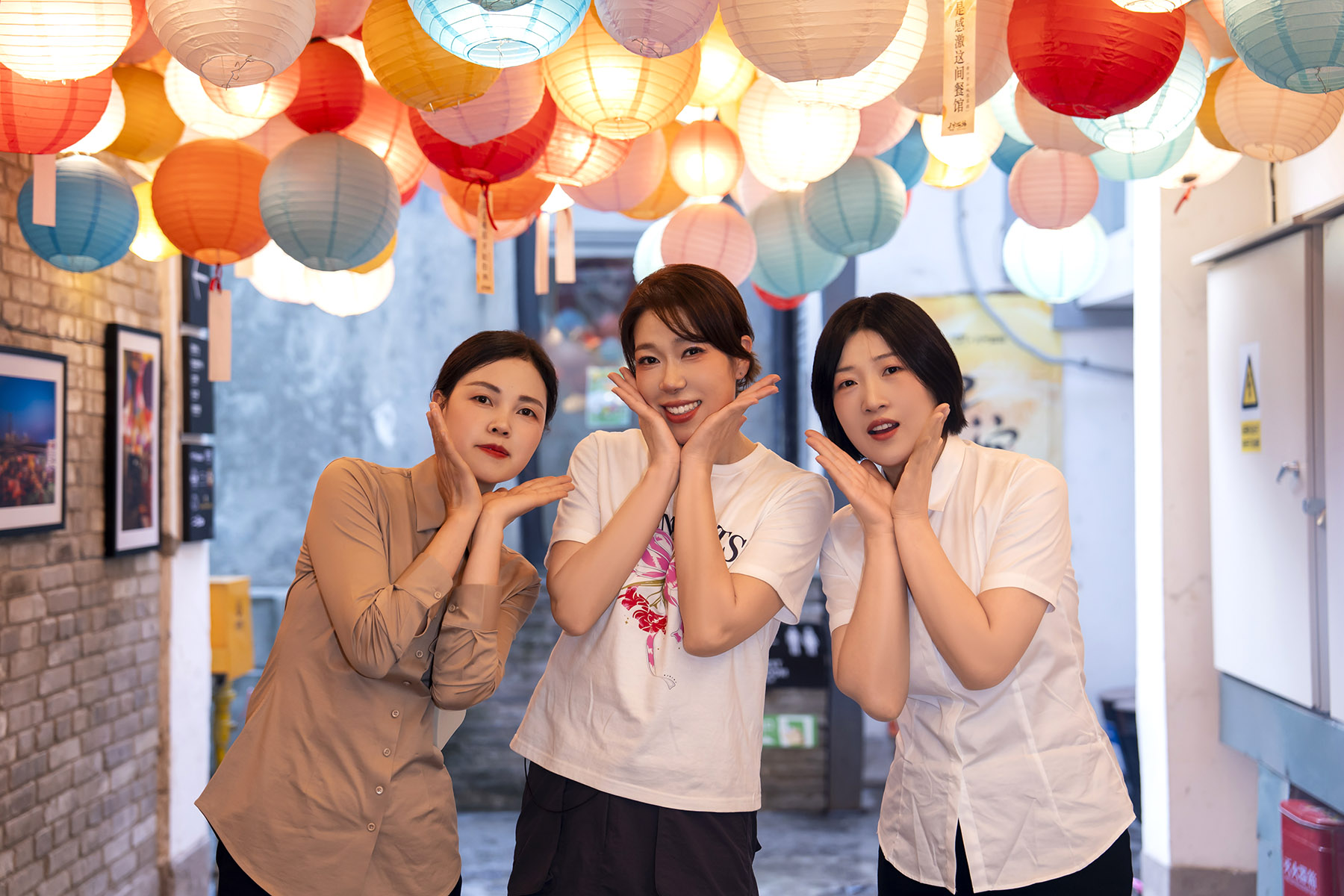TV productions that focus on local workers, traditions, and cuisine are a big hit with audiences on both sides

At seven in the morning, Hualala wakes up to the smell of the spicy noodles cooked by her mother. At eight, she and her husband take their child to kindergarten, kissing the boy goodbye before heading to work. By nine, she's clocked in at her workplace, where she manages several sections of tables, tidying up and preparing for the busy evening ahead.
Her lunch is at 1 pm. During the break, she sometimes joins colleagues for a game of mahjong — the loser must buy everyone ice cream — or they go to a dance class nearby. By 4:30 pm, the busy dinner hours begin: greeting guests, taking orders, carrying dishes, refilling water — nonstop until 9 pm. When she gets home tired at 9:30 pm, her mother has already prepared her favorite meal. After playing toy cars with her son and chatting about the day, another ordinary day ends.
This is the daily life of Qiu Qianyun, better known by her nickname Hualala, a 30-year-old waitress in a Chongqing hotpot restaurant. Last July, her everyday routine was turned into a South Korean reality TV episode — My Name is Gabriel. The show sends South Korean celebrities abroad to live for 72 hours in someone else's shoes.
READ MORE: S. Korea's ties with China to 'expand more'
Hualala's "life swap" partner was Yeom Hye-ran, a well-known South Korean actress who appeared in My Love from the Star and The Glory. "I'm indecisive and timid," Yeom told the production team. "I want to go somewhere bold and live more freely." Then a plane ticket took her to the perfect place — Chongqing.
When Yeom arrived, she was amazed by the city's dazzling night views — but what stunned her most was Hualala's workplace, Pipayuan Hotpot Restaurant, built along a hillside with over 400 staff and 700 tables, serving more than 5,800 guests at once.
It was certified by the Guinness World Records in 2022 as the world's largest hotpot restaurant.
As evening falls, the restaurant's tiered lights illuminate the slopes, with the steamy hotpots and bustling crowd forming a lively scene. The venue was even featured in China's 2025 Spring Festival Gala.
"The South Korean producers seemed more drawn to the place itself," Hualala said. "They weren't very particular about casting." Initially, the producers wanted Yeom to experience the life of the restaurant's general manager. But since the manager's teenage daughter was shy, the role eventually went to Hualala — turning her into the "Chongqing protagonist".
Before filming, the South Korean crew did detailed research into Hualala's life. One of the biggest challenges was learning mahjong, a local favorite pastime. To help them out, Hualala's family taught the assistant director and scriptwriter how to play it at home using their own automatic mahjong table — a dinner table that transforms by lifting its lid. "In Chongqing, six out of ten families have one," she said. "They loved it — South Koreans also have card games a bit like that."
During the shoot, Yeom fully lived as Hualala — with her family, at her workplace, following her routine — while Hualala herself took a rare three-day break. Although they are completely different people in real life, Hualala thought Yeom's performance was very close to her real life. "She even looked quite a match with my husband!" she joked.
One coworker explained to Yeom, "Hualala means someone with good looks and kindness."
Toward the end of the show, Hualala's colleagues recorded a touching video message for her. "They were shy on camera," Hualala said, "but I could feel their love." What moved her most was when her mother told Yeom, "I will always be your strongest support."
"If it weren't for this show, I would have lived an ordinary life that left no trace," Hualala added.
"Now, my son can watch it when he grows up. And if one day my mother is gone, I can still see her through this footage."
Sometimes, visitors from South Korea and Singapore who have watched the show come to the restaurant, asking, "Is Hualala here?" She often greets them personally, offering a fruit platter as a welcome gesture.
"Full of human warmth," said one of the panelists on My Name is Gabriel, describing Hualala's everyday life.
Lee Yu-ga, a 23-year-old student from South Korea who studied film in China for seven years, believes that South Korean production teams tend to focus more on China's human landscape — the emotional bonds and daily interactions between people.
"Compared with (South) Korea," Lee said, "relationships in China feel a bit closer, more intertwined. That subtle emotional connection is something that can really resonate with Korean audiences."

Key market
In recent years, more variety shows in South Korea have chosen China as a filming destination, venturing beyond Beijing and Shanghai to lesser-known cities that reveal local traditions and daily life.
Among those contributing to this cultural exchange is Jiang Lizi, a Miao ethnic girl from Guizhou province who has lived in South Korea for 13 years and works as a bilingual TV host. Recently, she appeared on the show Talk Pawon 25 O'Clock, which conducts "virtual travel" through online connections, allowing South Koreans living in different countries to introduce travel destinations, food, accommodation, and lifestyle.
In August, the show aired a Guizhou special, featuring the Huangguoshu Waterfall, Yelang Valley, and Qingyan Ancient Town. Jiang participated in the episode, sharing her hometown's culture.
Wearing hand-embroidered Miao ethnic clothing and elaborate silver ornaments, Jiang has made this her most distinctive personal image. Since she first entered the South Korean hosting industry more than a decade ago, she has taken every opportunity to introduce the traditional costumes of the Miao people to South Korean audiences.
"Every time, the response has been quite positive," Jiang said. "This kind of outfit gives them a real visual shock." Despite years abroad, she keeps several sets of traditional Miao attire, some handmade by her and her family.
After the broadcast, audiences in South Korea were impressed not only by her stunning attire but also intrigued by the dishes featured in the episode, such as Guizhou's sour soup fish and rice tofu. "These foods don't exist in South Korea, so it's hard for them to imagine what they taste like," Jiang explained.
Chinese cuisine has gained tremendous popularity in South Korea — especially dishes such as malatang and tanghulu. "You could say they've taken South Korea by storm," Jiang said.
A Chinese-Korean family living in Qingdao also shared similar perspectives in another South Korean variety show, Family Over the Border, which explored cities such as Qingdao in Shandong province, Chengdu in Sichuan province and Harbin in Heilongjiang province through the theme of food. The Chinese father in the show said, "Food serves as a common language between China and South Korea. The eating habits of our two countries are quite similar, so audiences can easily relate to it."
The production team of Talk Pawon 25 O'Clock also filmed in Chengdu, as well as Xi'an in Shaanxi province and Ningxia Hui autonomous region. According to Jiang's observations, South Korean crews tend to focus on places that showcase China's unique natural scenery or its historically rich ancient towns — locations rarely seen on South Korean television.
"South Korea's film and television industry is becoming increasingly international," Jiang said. "With South Korea facing a declining birth rate and a growing immigrant population, entertainment content is no longer confined to domestic topics."
She added that China is always viewed as a key market for South Korean productions. "Whether filming in China or incorporating Chinese elements into their shows, producers are likely trying to engage more Chinese viewers," Jiang said.

Bilingual host
Fluent in Chinese, South Korean TV host Saereun believes that learning the language has opened many doors in her professional career. While many of her peers in South Korea have either married or moved away from broadcasting, Saereun continues to appear regularly on stage — a fact she credits to the opportunities her Chinese skills have provided.
Born in 1983, Saereun began studying Chinese in college and spent one semester each as an exchange student in Harbin and Xiamen in Fujian province. She later attended the Graduate School of Interpretation and Translation at Ewha Womans University in South Korea before officially beginning her career as a bilingual TV host.
Her first trip to China was to Harbin, a city whose northern dialect she still feels most comfortable with. "It can sometimes be a bit challenging to understand people from southern cities like Xiamen," she said. "But people from both sides are kind and gentle."
In 2005, while studying in Harbin, Saereun witnessed the nationwide sensation sparked by the Chinese TV talent show Super Girl, which popularized the slogan "If you want to sing, sing out loud". Anyone could register to sing for 30 seconds in front of the judges.
Saereun also signed up to compete in the Harbin regional auditions, but as a newcomer unfamiliar with the city's transportation system, she would have struggled to find the venue if not for her Chinese friends, who offered to accompany her on the one-hour bus ride. "My Chinese friends helped me so much during my studies," she said. "I'll always be grateful for their kindness."
That year, Super Girl became a cultural phenomenon, setting viewership records for Chinese reality TV. National champion Li Yuchun even appeared on the cover of Time Asia. Saereun, however, was eliminated in the first round of auditions.
This year, Saereun once again found herself connected to a major talent show — Boys II Planet, where she served as the host for the debut group's fan meeting. Produced by one of South Korea's largest entertainment companies, the show was filmed in Korean and Chinese, featuring 160 male contestants from around the world, with eight debuting in the final lineup — including three from China.
Saereun said the show is currently one of the hottest programs in South Korea, with Chinese contestants attracting significant attention. "When I post about them on social media, some (South) Korean fans comment that they like a particular Chinese contestant so much that they've started learning Chinese."
According to her, the show's producers plan to launch a new season in December focused solely on the Chinese contestants. "No matter the country," Saereun said, "producers always chase ratings — they want to make the most talked-about shows."
Asked why Chinese contestants have become so popular, Saereun pointed to the influence of Chinese actor Yu Xiaoguang, who gained fame in South Korea through the 2017 reality show Same Bed, Different Dreams, which depicted the daily lives of celebrity couples. At the time, even the current South Korean president, Lee Jae-myung, and his wife appeared on the program. Yu participated alongside his actress wife from South Korea, Choo Ja-hyun, forming a beloved cross-cultural couple.
"He left a strong impression on (South) Korean audiences as a kind, family-oriented man," said Lim Ji-su, a 22-year-old student from South Korea who studies in China. Echoing that sentiment, Saereun added that, "Young Koreans, especially those in their teens and twenties, now particularly admire gentle, sweet-tempered Chinese men."
Saereun's career has taken her across China, from bustling metropolises to remote rural villages. She has even hosted fan meetings in China attended by tens of thousands of people. "That was one of the happiest moments of my career," she said.
ALSO READ: Televised reality show break the mold
"China and (South) Korea are like old friends — we know each other well and are both proud of our own cultures," Saereun added. "Differences in views on history or social issues are natural, but if the media can share more positive and constructive stories, it will help create a better atmosphere for communication between our peoples."
Meanwhile, Jiang Lizi continues to run her own video channels on both Chinese and Korean social media platforms — sharing her life in South Korea with Chinese audiences and introducing Chinese culture to South Korean viewers.
"Sometimes it feels like I can't please either side," she said, "but I see myself as a platform for debating. If my videos can help reduce even a little bit of misunderstanding between the two countries, then my work is worthwhile."
For Jiang, the most effective form of cultural exchange is direct experience. "You have to go and see for yourself — only by experiencing something firsthand can you form a new perspective," she said. Many of her South Korean friends who have visited China have come back with good impressions, she added.
In November last year, China announced a visa-free policy for ordinary South Korean citizens, making travel between the two countries easier. Saereun, who has long enjoyed running marathons, has already signed up to participate in one in Shanghai on Nov 30.
A decade ago, Jiang once dreamed of producing her own variety show, one that would take foreigners across China's 56 ethnic villages to live with local families. "I want to see what kind of chemistry would happen," she said.
And perhaps, just like Hualala's story, those real human connections — shared over food, laughter, and daily life — are what move audiences the most, wherever the camera comes from.
Contact the writers at baishuhao@chinadaily.com.cn


